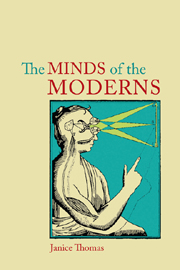Book contents
- Frontmatter
- Contents
- Acknowledgements
- Abbreviations
- Introduction
- I Descartes
- II Spinoza
- III Leibniz
- 11 Is the mind a substance for Leibniz?
- 12 Self-knowledge and the monads
- 13 Leibniz on consciousness and unconscious perceptions
- 14 Leibniz and the problem of mental causation
- 15 Leibniz and representation
- IV Locke
- V Berkeley
- VI Hume
- Conclusion
- Bibliography
- Index
11 - Is the mind a substance for Leibniz?
from III - Leibniz
- Frontmatter
- Contents
- Acknowledgements
- Abbreviations
- Introduction
- I Descartes
- II Spinoza
- III Leibniz
- 11 Is the mind a substance for Leibniz?
- 12 Self-knowledge and the monads
- 13 Leibniz on consciousness and unconscious perceptions
- 14 Leibniz and the problem of mental causation
- 15 Leibniz and representation
- IV Locke
- V Berkeley
- VI Hume
- Conclusion
- Bibliography
- Index
Summary
The brief answer to the title question is that each human mind is indeed an immaterial substance for Leibniz. This might seem to threaten his theory of mind with the same stubborn problem of accounting for mind-body interaction that many have regarded as fatal for Descartes. However, Leibniz's theory of mind is very far from being just a revamped Cartesian dualism. In fact, it is not a dualism at all but rather an idealism or immaterial monism.
Or is it? Leibniz certainly also insists that material bodies such as the human body and those of other animals and physical things are not illusions. So what is a human mind for Leibniz, what is a human body and what is the relationship between the two? And what is the difference between Leibniz's metaphysical position and Descartes's dualism? In order to begin answering these questions it is necessary first to summarize what Leibniz says about what he calls “monads”.
Monads
The term “monad” (from “monas”, Greek for “unit”) is used in the Monadology for what Leibniz, in the earlier Discourse on Metaphysics and other writings, had called “a simple substance”. Remember that Descartes worked with an essentially Aristotelian notion of substance (or what is most fundamental in created reality) according to which a substance is ontologically independent: it depends for its existence on no other created thing. Descartes also retained the Aristotelian view that substances have logical priority in the sense that items in other categories – qualities, quantities and so forth – are predicable of (“said of”) them whereas substances are always subjects.
- Type
- Chapter
- Information
- The Minds of the ModernsRationalism, Empiricism and Philosophy of Mind, pp. 102 - 109Publisher: Acumen PublishingPrint publication year: 2009

